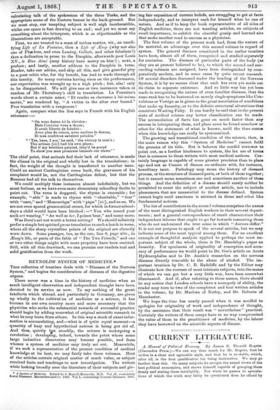REYNOLDS' SYSTEM OF MEDICINE.* Tuts collection of treatises deals with
"Diseases of the Nervous System," and begins the consideration of diseases of the digestive organs.
There never was a time in the history of medicine when so much intelligent observation and independent thought have been devoted to its service as now. To say nothing of the great intellects which abroad, and particularly in Germany, are given up wholly to the cultivation of medicine as a science, it has become in our own country more and more necessary that the physician who seeks the substantial rewards of successful practice should begin by adding somewhat of original scientific research to what he may learn from others. In this way a stock of exact infor- mation is accumulating, and—what is of quite equal moment—a quantity of hazy and hypothetical notions is being got rid of. And thus, quietly bit steadily, the science is undergoing a revolution ; developing, indeed, towards the point where some large inductive discoveries may become possible, and from whence a system of medicine may truly set out. Meanwhile, if we seek a representation of the present condition of medical knowledge at its best, we may fairly take these volumes. Most of the articles contain original matter of much value, or subject received facts and teachings to new investigation. The writers while looking broadly over the literature of their subjects and giv-
* A System of Medicine. Edited by J. Russell Reynolds, M.D. Vol. IL, containing Local DIDO&B438. Macmillan and Co. 1868. Vol. L, containing General Diseases. 1866. ing fair exposition of current beliefs, are struggling to get at facts independently, and to interpret each for himself what he can of nature. And as if to keep the book representative of all sides of English medicine, there are not wanting articles, on subjects of small importance, to exhibit the cheerful gossip and learned airs that make another road to success as a physician.
The first volume of the present work had, from the nature of its material, an advantage over this second volume in regard of system. The general diseases considered in the earlier treatises have been, almost all of them, recognized and studied separately for centuries. The diseases of particular parts of the body (as they are at present believed to be), to which the second and suc- ceeding volumes are assigned, have been distinguished by com- paratively modern, and in some cases by quite recent research. Of several disorders discussed under the heading of the Nervous System, it is by no means clear that each has even yet made out its claim to separate existence. And so little way has yet been made in recognizing the nature of even familiar diseases, that the &1111e rank has to be bestowed on merely single symptoms like Con- vulsions or Vertigo as is given to the great association of conditions that make up Insanity, or to the definite structural alterations that constitute Wasting Palsy. It can hardly be said that in the present state of medical science any better classification can be made. The accumulation of facts has gone on much faster than any success in interpreting them, and place must be found somehow or other for the statement of what is known, until the time comea when this knowledge can really be systematized.
The growing and transitional condition of the science, then, is the main reason why this "System of Medicine" cannot fulfil the promise of its title. But it behoves the candid reviewer to point out, as a further hindrance to system, the lax use of terms that is common to these writers with most medical authors. Cer- tainly language is capable of some greater precision than to place age and sex as Causes of disease co-ordinate with, for instance, hereditary taint. Pathology may mean the history of diseased process, or the structure of diseased parts, or both of these together; but it cannot mean sometimes one and sometimes another of these things. And the definition of a disease should surely neither be permitted to cover the subject of another article, nor to include phenomena that are unessential to the disease defined. System cannot begin until exactness is attained in these and other like fundamental notions.
The list of contributors to the second volume comprises the names of the most distinguished English workers in their several depart- ments; and a general correspondence of result characterizes their independent labours that ought to go far towards reassuring those who do not understand the true sense in which "doctors differ." It is not our purpose to speak of the several articles, but we may indicate some of the most typical among them. For an excellent example of thoughtful analysis applied to perhaps the most im- portant subject of the whole, there is Dr. Maudsley's paper on Insanity. For specimens of originality of conception and accu- racy of performance we would point to Dr. Gee's article on Acute Hydrocephalus and to Dr. Anstie's researches on the nervous diseases directly traceable to the abuse of alcohol. The im- portant treatises by Dr. C. B. Radcliffe and by the Editor may illustrate how the recesses of most intricate subjects, into the mazes of which we can get but a very little way, have been somewhat illuminated. And if, after referring to these names, there should be any notion that London schools have a monopoly of ability, the reader may turn to two of the cotnpletest and best written articles in the volume, by Dr. Maclean of Netley, and Dr. Roberts of Manchester.
We hope the time has nearly passed when it was needful to apologize for originality of work and independence of thought, by the assurance that their result was " nevertheless" practical. Certainly the writers of these essays have in no way compromised the value of them to the practitioner of medicine, by the labour they have bestowed on the scientific aspects of disease.






























 Previous page
Previous page